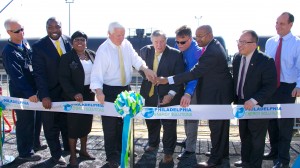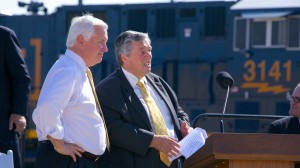Philly refinery unveils new rail facility for Bakken crude transport, sets sights on Marcellus

Nat Hamilton/StateImpact Pennsylvania
CEO of Philadelphia Energy Solutions Philip Rinaldi, center, Governor Tom Corbett, left, Mayor Michael Nutter, right, help cut the ribbon on a new rail facility at the Philadelphia Energy Solutions refinery in South Philadelphia.
Hundreds of businesspeople joined refinery workers for a ribbon-cutting Wednesday on the dusty terrain of Philadelphia Energy Solution’s revamped refinery complex in South Philly.
Just over a year ago, the 140-year-old Sunoco refinery was on the verge of closing its doors. Now, the facility is a key player in America’s energy boom as the single largest consumer of crude oil from the Bakken Shale in North Dakota.
CEO Phil Rinaldi proudly described the refinery’s latest accomplishment as a trainload of Bakken crude rumbled along new tracks to a state-of-the-art unloading facility.
Two of these trains, or more than 160,000 barrels of Bakken crude roll into the refinery every day. Rinaldi said the new rail yard could even allow the refinery to handle up to three trainloads a day if the market cooperates. He likes that kind of flexibility.
“Times change and if the better crudes start moving down into the Utica, we can take it by rail. If it’s in the Permian Basin, we can take it by rail,” Rinaldi said. “So we’re connected everywhere and we don’t get locked in.”
But the nationwide trend of transporting high volumes of this light, sweet crude by rail has come under scrutiny in the wake of the tragic train derailment in Lac-Megantic, Quebec last summer. On their way to the refinery, these trains roll through densely populated suburbs and through Center City on elevated tracks straight past major buildings like the Philadelphia Museum of Art and 30th Street Station. Environmental activists are starting to express concerns.
But Rinaldi said what happened in Canada couldn’t happen in Philadelphia, at least not within the confines of the refinery’s new rail facility.
“There’s never an unattended train and these trains are always fully braked when they’re here in the yard. Not only are they fully braked, they’re also, chocked so they can’t move.”

Nat Hamilton/StateImpact Pennsylvania
CEO of Philadelphia Energy Solutions Philip Rinaldi and Governor Tom Corbett watching a CSX train arrive supplying oil to the Philadelphia refinery.
Rinaldi told reporters he supports the increased attention being given to rail safety and didn’t express any qualms about ramping up shipments of Bakken crude by rail. And he’s not stopping there.
The Philadelphia Inquirer reported earlier this week that Rinaldi is chairing a group of business leaders strategizing about how to build a pipeline that would bring Marcellus Shale gas to Philadelphia. The pipeline would support a planned expansion of the 1,500 acre refinery complex, as well as industries nearby.
Governor Tom Corbett, who was also present for the ribbon-cutting, supports the idea.
“It’s going to grow the jobs in Southeast Pennsylvania, not just in the Southwest and North Central,” the governor said. “It’s a renaissance for this state.”
The pipeline is still in the early stages of development, but Rinaldi says it could be the key to making cheap Marcellus gas even more valuable.
















